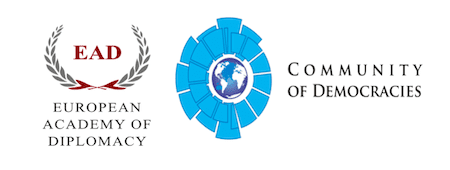Transitional Diplomacy- A new program by the Community and the European Academy of Diplomacy


January 9, 2014
In recent years, diplomacy has taken on more of a human face. Especially when engaging with societies in transition, democracy and human rights can be among the most active topics in the work of a diplomat. There is no codified set of procedures for diplomats to respond to calls for democracy support, but there has been considerable past experience that might be helpful. The Community of Democracies and the European Academy of Diplomacy are glad to announce the launching of “Transitional Diplomacy- A Diplomat's Handbook” – a program designed for mid career diplomats to aid in the development of a professional toolkit to be used while working with stakeholders of countries in transition.
The program is based on the Community of Democracies' "A Diplomat's Handbook" and is designed to present case-study experiences, specific resources available to diplomatic missions, and highlight ways diplomats have previously supported requests for civil society assistance.
The Transitional Diplomacy program, to begin in May 2014, will connect experienced diplomats and experts from the academia with diplomats currently facing the challenges of assisting states in transition. The program is modeled on a global case-study approach and will pull deeply on successful experiences of transition and 21st century models for political, social and economic transformation, peaceful revolution and reconciliation.
What is the "Transitional Diplomacy" Program?
The process of becoming democratic is something that must come from within and cannot be packaged, exported and implemented from outside. Transitional Diplomacy is a set challenges and opportunities for diplomatic missions who would like to foster, empower and mentor transitional elements under authoritarian regimes. It is balancing action and direct involvement with the appearance of inaction and non-response. Transitional Diplomacy is:
- Supporting and advising transition without overtaking ownership;
- Demonstrating democratic leadership by example;
- Understanding that every transitional situation is unique;
- Listening, respecting and understanding stakeholders involved in the transition;
- Responsibly reporting the situation in the country to external stakeholders;
- Defending democracy activists;
- Facilitating dialogue between stakeholders and promoting non-violent resolutions.
The program will last for six days, including fourty intensive hours of lectures, seminars, workshops, study visits, case studies, simulations and networking, provided by an international faculty of renowned world-class scholars and experienced policy practitioners. It contains a unique combination of practice and theory, allowing the participants to work through real-life simulations, as well as participate in problem-solving discussions and activities, giving insights into the difficult tasks of decision-making with a "getting down to cases" learning model.
Block I- Transition Analysis: Past, Present and Future
Analyses of democratic transitions through a guided case-study approach is designed to give participants a clear understanding of the various keys to supporting successful democratic transitions and how to recognize and avoid previous mistakes. This block will focus on understanding the mechanics of transition: gauging the temperature of change, comparisons of violent and non-violent movements, reactions of the regime, and post-transitional paths. Upon completion of the block, participants will have developed a set of secondhand experiences based on past cases, current efforts and future ideas and plans for countries most likely to undergo democratic transformation.
Case studies:
- Poland: Solidarity for democracy
- South Africa: Post-Apartheid reconciliation
- Reformasi: Post-Suharto era of Indonesia
- Myanmar: Open for business
- Colombia: Peace at last?
- The Eastern Partnership: Steps forward, steps backwards
- The horn of Africa: Learning from mistakes
- Afghanistan: Intervention and state-building
- Successes and failures of the Arab Spring
- Syria, Egypt, Yemen: Ongoing transitions and revolutions
Block II- Supporting Transition
The first block gave participants experience-based knowledge on the successes and failures of past and present transitions. The current block will focus on developing a toolbox of skills and knowledge to prepare participants for playing an active role in democratic transition from a diplomatic standpoint. Through seminars and workshops, participants will develop answers and actionable plans towards important challenges that diplomats face.
Seminars:
- Sharing transitional experience from the Polish foreign policy
- Using social media to support democratic transition
- Strategy building for engaging and supporting democratic transition
- Strategies for supporting civil society
- The role of the diplomat and other actors
Key outcome: Action plan to support future diplomats
A key deliverable of the Transitional Diplomacy course will be the development of an action plan- Supporting Transitioning Democracies. This report, prepared by the participants upon the completion of the program, will be presented to the Permanent Secretariat and the Governing Council of the Community of Democracies.
For further details and for registration to the course, visit the website of the European Academy of Diplomacy.



